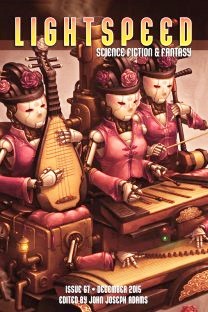Reviewed by Colleen Chen
In “Tomorrow When We See the Sun,” by A. Merc Rustad, Mere, a construct of machine-flesh imbued with bits of humanity, wakes up from stasis to perform its function as executioner. Its victim is the last wolflord—a name given to the survivors of destroyed warships who refused allegiance to the Principality that rules the worlds. Before it slits the wolflord’s throat, the man says Mere’s name, and tells it he loved it once; Mere uses illegal mods on its palms to steal the neural imprints of the wolflord’s last memories. Once back in stasis, Mere dreams, and with the stolen memories begins to uncover its own erased history, a remembered purpose, and wrongs to be undone.
This is a gorgeous story, a pleasure to read for the prose alone. It offers only a taste and an impression of a complex mythology-history, although both the concepts of its science, and its themes, are both common within the genre—the development of self and emotion within a machine, the composition of self and memory, ideas of rebirth applied on a multi-world scale.
“Tea Time” by Rachel Swirsky feels like poetry in prose form—a poem about Alice in Wonderland, one whose development is mad, dreamlike, and cyclical, perhaps as much as the original story deserves. The Mad Hatter is involved in a relationship with the March Hare, their interaction based partially on lust and partially on fear, and they have tea and bawdy times together in turn. Alice, the dormouse, and the Cheshire cat weave in and out of the story, as do bits of verse and commentaries about the nature of Time.
I’ve never used this phrase before to review a story, because I’ve seen it too many times in other reviews—but it seems appropriate now to say that it just wasn’t my cup of tea. I think this would be a piece that would work well read aloud and half-listened to, letting the images it creates flow one into the other. It truly is beautiful prose and shows obvious talent from the writer. But reading it on my computer, I did so with my brow furrowed in deep confusion throughout, and my second time through I couldn’t even process it. It was one of those stories that is so clever that it goes right over my head. Probably best appreciated by those who like their work on the literary side, or who enjoy surrealism for its own sake.
In “Beneath the Silent Stars,” by Aidan Doyle, Jean-Paul has traveled to the planet Amala to discover why the ship Mariposa X destroyed the hyperspace gate, which had linked humanity to the rest of galactic civilization. The ship, which has fired on all other ships that have approached it, has requested Jean-Paul’s presence, and Jean-Paul hopes to find out what happened to his father, last known to be on board the Mariposa X. Jean-Paul’s only companion on board is his lover and work colleague, Parveen. His love for Parveen conflicts with his mistrust of her motives, his doubts that she truly loves him in return. These two mysteries—what happened with the Mariposa X and the hyperspace gate, and whether Parveen really loves him—are clarified in the light of a sobering truth that is revealed by Jean-Paul’s father’s final message to his son.
This story uses plot elements and a plausible, if somewhat trite future universe more as a backdrop for revealing Jean-Paul’s character than as ends in themselves. I liked this angle on the story, although the execution felt awkward to me. There were a few too many unnatural and sappy speeches that didn’t strike me as realistic dialogue—“Why do you love me?” “You have eyes that shine.” Bits of background about Jean-Paul in relation to others just make him annoying and unlikable. And Jean-Paul’s acceptance of the situation, once Mariposa X reveals it to him, feels too pat and not in character. The story held my interest, but I didn’t feel entirely engaged.
“Ex Libris Noctis,” written by the late Jay Lake, tells the story of a woman’s psychological journey through self-conflict over her father’s death. Told in a series of dreamlike sequences in which Beatrice is late for her father’s funeral, she flies through traffic, peruses moths pinned to walls, and speaks with dead colleagues of her father’s. Through flashbacks and eerie scenes of brasswork replacing her heart, we see both sides of the anger and the love that have numbed Beatrice to her own existence.
It took about half the first read of this story for me to understand that it wasn’t a steampunk piece, what with the brass gears in Beatrice’s body. The atmosphere, too, takes some getting used to; although the prose is beautiful, it’s on the flowery side, to the point of being distracting. That said, once the threads of the story started to make sense to me I began to appreciate the craftsmanship of a unique and intricate story whose form reflects both the broken spirit of its protagonist, and the keys to her healing.
Colleen Chen is the author of the novel Dysmorphic Kingdom and can be located at www.colleenchen.com.
 Lightspeed #67, December 2015
Lightspeed #67, December 2015